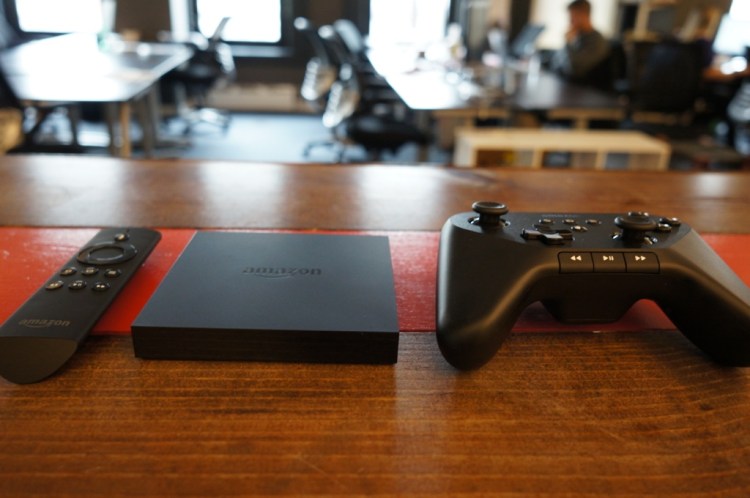GamesBeat: Some people identified an interesting strategy years ago now, which was the Android micro-consoles. It’s an interesting opportunity, but I wonder why it’s happened so slowly. The theory a few people talked about a few years ago was, “People love these free-to-play games on iOS, so why don’t we do that in the living room and disrupt the $60 game market?” But the reality hasn’t materialized in the way a lot of people thought it would.
Vogel: I think that’s going to change. Anecdotally, speaking for myself, hardware is hard. But we also had to get a sense of what customers want. What was great when we started taking the Fire TV to developers was that they were saying they wanted to buy the device themselves. That was the inflection point we needed to get something we could show, that we were proud of and that we thought customers would like and that we thought mattered to developers.
GamesBeat: You had the hardware to set this in motion.
Evans: There’s a lot of demands on a piece of hardware like that. It has to be economical. It has to be great for video, because that’s an expectation. It has to be great for the games that it brings, competitive in that space.
My first job at Amazon was running Amazon Instant Video. The other thing we learned in that business is that claiming space in the living room is very hard. The devices don’t turn as quickly. The desire to put something else in your complicated home entertainment setup is a tough barrier to get people over. Getting to where we had the right offer was challenging.
GamesBeat: People could argue that Amazon has done this well, but maybe too slowly. There are 35 million iOS devices being sold each quarter now or maybe 45 million if you count iPads. It’s hard to compete with that. You’re selling your first phone now.
Evans: It’s hard to call this a mature market, but it’s a market where others have moved first, certainly. What I’ve learned inside Amazon is that we commit to things for the long term. I often challenge people to think of something that Amazon has started and not stuck with. Some of those efforts grew very quickly and some of them grew more slowly, but it’s very difficult to find something where Amazon hasn’t, over time, gained expertise.
Everything we do, we aspire to have the market segment leader immediately. But not everything we do goes that way. But that doesn’t dissuade us. We believe we have something unique to offer customers, that’s important to our customers. We focus on that and stay with it. The long-term results speak for themselves.
Vogel: Creatively, what many of us are attracted to is that track record behind the brand, the technological prowess, and that long-term vision of things. It’s intoxicating to a creative person. You’re not on a two-year cycle to just get the next title out. The customer focus is real and I love that about being at Amazon. That can stop a conversation at any level: what’s the value to the customer?
GamesBeat: It’s an interesting collection of assets or properties that Amazon has here. How do you think of them as part of one company or one platform? You have app stores. You have AWS. You have the App Stream. You have all this cloud technology. You have game studios and so many other things. Do you think of them as something that can be collectively all turned toward games?
Vogel: I should be careful here, but I feel like it’s an interchange. We’re driving hardware specs and helping different teams understand what gamers want while they’re thinking about a broader consumer base. It’s not a giant ship that needs to point in one direction. It’s a series of things that feed together to all meet different requirements.
Evans: I’d compare it to watching a flock of birds. By design, they all move generally in one direction, but they’re not forced to all fly in one single line. The way we maintain the individuality of each effort and the innovation is not to top-down plan and say, “Everything in Amazon will address this market or that market in this specific way.” But we certainly think a lot and talk across groups about how to coordinate, how to serve this market, what you have that we can use, what we have that you can use.
We very purposefully keep that coordination more informal, because we see that if you try to rigidly orchestrate—Our experience watching others is that that can slow down. To return to the bird analogy, we’d rather have everyone flying as fast as they can and heading in the same general direction than trying to line everyone up perfectly.
VentureBeat's mission is to be a digital town square for technical decision-makers to gain knowledge about transformative enterprise technology and transact. Learn More



